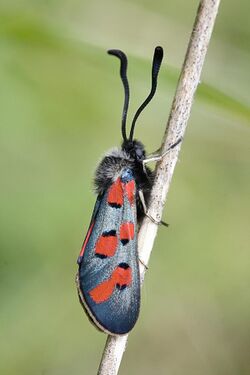Biology:Zygaena rhadamanthus
| Zygaena rhadamanthus | |
|---|---|

| |
| Scientific classification | |
| Domain: | Eukaryota |
| Kingdom: | Animalia |
| Phylum: | Arthropoda |
| Class: | Insecta |
| Order: | Lepidoptera |
| Family: | Zygaenidae |
| Genus: | Zygaena |
| Species: | Z. rhadamanthus
|
| Binomial name | |
| Zygaena rhadamanthus (Esper, 1789)
| |
| Synonyms | |
| |
Zygaena rhadamanthus is a species of moth in the Zygaenidae family. It is found in France , Spain , Portugal and Italy.[1]
The larvae feed on Onobrychis, Dorycnium pentaphyllum and Lotus species.[2] The species overwinters in the larval stage.
Technical description and variation
Z. rhadamanthus Esp. (6g). Forewing strongly transparent, glossy grey, with 6 red spots, the 2., 3., 4. and 5. being edged with black at the proximal and distal sides. Riviera and Catalonia. — cingulata Led. (6h) [ ab. of rhadamanthus] has a red belt. This is a normal form in Spain, while in Liguria only single individuals of it are found among typical specimens. —kiesenwetteri H.-Sch. [Z. rhadamanthus ssp. kiesenwetteri Herrich-Schäffer, 1852] (6h) has quite a different aspect on account of the deep black ground-colour of the forewing and the black hindwing, resembling lavandulae or stoechadis, but the black edges of the spots of the forewing are easily visible on the black ground. — algarbiensis Christ. [Z. rhadamanthus ssp. algarbiensis Christ, 1889] (= roederi Stgr.) (6h), from South Portugal, is similar, but the 6. spot of the forewing is entirely obsolete or only slightly vestigial. — Larva variegated, grey, black, longitudinally striped with white and yellow, with red collar; in April full-grown on Dorycnium. Pupa in a white oval cocoon. The moths in spring till May, frequently sitting on stalks of grass. [3]
Subspecies
- Zygaena rhadamanthus rhadamanthus
- Zygaena rhadamanthus alfacarensis Reiss, 1922
- Zygaena rhadamanthus algarbiensis Christ, 1889
- Zygaena rhadamanthus aragonia Tremewan, 1961 (Spain: provinces of Cuenca and Teruel)
- Zygaena rhadamanthus aurargentea Mazel, 1979 (France: Pyrénées-Orientales, Spain: Barcelona and Girona)
- Zygaena rhadamanthus azurea Burgeff, 1914 (France: départements of Var and Alpes-Maritimes)
- Zygaena rhadamanthus caroniana Reiss, 1965
- Zygaena rhadamanthus gredosica Reiss, 1936
- Zygaena rhadamanthus grisea Oberthur, 1909 (south-eastern and southern-central France: from Alpes-de-Haute-Provence and Hautes-Alpes to Isère, Drôme, Ardèche, Vaucluse, Aveyron, Lot and Lozère)
- Zygaena rhadamanthus guichardi Tremewan, 1991
- Zygaena rhadamanthus isabelae Gonzalo Fidel, 1980
- Zygaena rhadamanthus kiesenwetteri Herrich-Schaffer, 1852
- Zygaena rhadamanthus rasura Agenjo, 1948
- Zygaena rhadamanthus stygia Burgeff, 1914 (east of the River Var in Alpes-Maritimes in France to Imperia in Italy)
References
- ↑ Fauna Europaea[|permanent dead link|dead link}}]
- ↑ Schmetterlinge und ihre Ökologie
- ↑ Seitz, A., 1913, in Seitz, Gross-Schmett. Erde 6: 22.,The Macrolepidoptera of the Palearctic Fauna 2. Volume: The Palearctic Bombyces & Sphinges. pdf
 This article incorporates text from this source, which is in the public domain.
This article incorporates text from this source, which is in the public domain.
Wikidata ☰ Q3576388 entry
 |

